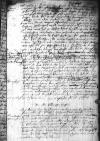Ewer Erbarkeit bedenckenn, was unsere zu kunfftiges zu samne komen uff Sankt Michels tag anghet, / hot uns noch gelegenheit disser ferlichen czeit wol gefallenn, / vorgleicht sich ouch mit anderer hernn ⌊disser lande⌋ ⌊koniglichen rethe⌋ meynung, / derwegenn wir solchs mit den erstnn an ⌊konigliche majestet⌋, unsern allergnedigsten hern, wollen durch unsere schreibenn mit eigenem botnn lossen gelangenn und anczeigenn alles das jenige, das uns zu gedochtes tags haldung aus billichnn, notlichen ursachen hot gehindert und abczogenn, / mit erbittung, / so ire konigliche majestet villeicht des hern rethen, / do an gelegenn, / etwas gesint were zu thun oder handlen befelenn, / das solchs ire majestet an sie schrifftlich thet stellenn, / do mit sie under in durch botschafft oder brive daruff sich mochtnn berotenn und irer majestet ... willen ... vil muntlich ...s werk bringen, / dornoch weiter ire majestet berichtnn . Ouch beduncket uns nebnn etlichnn andren hern zuerhalten im lande einigheit vonn ⌊koniglicher majestet⌋ zu bittnn, / mandat zu gebenn, / das uff die zceit, so die ⌊hern rethe⌋ zu samne mochtnn komenn, / von der vorgangen ax ist rechenschafft denn hern rethen wurd gethon, / domit zcwischen dem loblichen ⌊adel⌋ und kleinenn steten der czank des birbrawens halbnn mochte werden hingelegt, / unnd alle andere sachen, / wie Ewer Erbarkeit in irem schreibnn melden, / uff zu kunfftige ⌊tagefart⌋, / wan die gehalten mag werden, / den partenn irer gerechtigkeit unschedlich, / zu vorlegen und vorweisenn. Was wir widerummb vor antwurt erlangenn, / sol Ewer Erbarkeit, / die wir Gote in sein gnad befelenn, / mit den erstnn wissenn. /
In der Elbinger briff etc.
Die brive, die der ersame und unser besonder freundt, her ⌊Michel Schone⌋, [Euer] Erbarkeit mittels ⌊borgemeister⌋ von ⌊Krako⌋, mith sich an uns geschribenn gebrocht, / sein uns worden und der gehabten muehe thue wir uns gen sein erbarkeit bedancken, / dergleichnn ouch gen Ewer Erbarkeit, das die unseren briff an denn grosmechtigen hern ⌊marienborgschnn woywoden⌋ etc. habn lossen bestellenn, bittende, dissen beygebunden an sein grosmechtigkeit, darinnenn wir den tag uff Sankt Michaelis abschreibnn, / ouch wollen lossen zu komenn.
